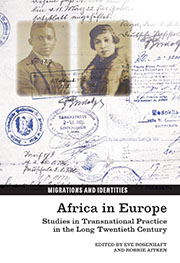Book contents
- Frontmatter
- Contents
- Acknowledgements
- List of Illustrations
- List of Abbreviations
- List of Contributors
- 1 Introduction
- I Enacting Identity: Individuals, Families and Communities
- II Authenticity and Influence: Contexts for Black Cultural Production
- III Post-colonial Belonging
- 10 Of Homecomings and Homesickness: The Question of White Angolans in Post-Colonial Portugal
- 11 Blackness over Europe: Meditations on Culture and Belonging
- IV Narratives/Histories
- Bibliography
- Index
10 - Of Homecomings and Homesickness: The Question of White Angolans in Post-Colonial Portugal
from III - Post-colonial Belonging
- Frontmatter
- Contents
- Acknowledgements
- List of Illustrations
- List of Abbreviations
- List of Contributors
- 1 Introduction
- I Enacting Identity: Individuals, Families and Communities
- II Authenticity and Influence: Contexts for Black Cultural Production
- III Post-colonial Belonging
- 10 Of Homecomings and Homesickness: The Question of White Angolans in Post-Colonial Portugal
- 11 Blackness over Europe: Meditations on Culture and Belonging
- IV Narratives/Histories
- Bibliography
- Index
Summary
The theme of this chapter is the perceptions of home and belonging of white Angolans in Portugal. The Portuguese arrived in Angola in the sixteenth century and during the New State regime (1933–74) until Independence in 1975 the country was the most important colony in the Portuguese empire. The migration to Portugal of the people I write about here took place in relation to the Angolan War of Independence (1961–75). The 500, 000 to 800, 000 migrants who arrived in Portugal as a consequence of the independence of the former colonies were labelled retornados, or the returned, a label including those who saw themselves as white Angolans. I argue that this categorisation breaks with the subjective experiences and various notions of belonging revealed through their biographical narratives, for while retornado implies ‘a home-coming after a temporary absence’, over 40 percent of those who arrived from Africa had been born and brought up there. Their narratives and identities link to particular public discourses and collective experiences of immigration in the Portuguese context. However, the specific stories of white Angolans who were born in Africa also reveal their ‘betwixt and between-ness’. These transnational migrants do not ‘fit’ in with how the national past of Portugal is constructed or in a global system of nation states or national order of things Not only have they crossed geographical borders, they also contest the boundaries of racialised nationness and what can be considered shared historical experiences and identities.
- Type
- Chapter
- Information
- Africa in EuropeStudies in Transnational Practice in the Long Twentieth Century, pp. 183 - 200Publisher: Liverpool University PressPrint publication year: 2013

